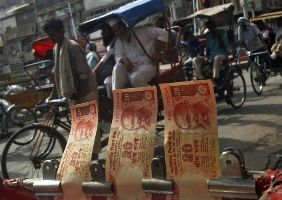 | « Back to article | Print this article |
Under the old GDP series, quarterly output had been declining, but under the new series it was increasing
 One of the highlights of the policy analysis here is an annual seminar organised by the city’s five leading economic policy think tanks to analyse the provisions in the Union Budget.
One of the highlights of the policy analysis here is an annual seminar organised by the city’s five leading economic policy think tanks to analyse the provisions in the Union Budget.
This year’s iteration was held on Monday, and was organised, as before, by the Centre for Policy Research, the Indian Council for Research in International Economic Relations or Icrier, the National Institute of Public Finance and Policy or NIPFP, the India Development Foundation or IDF, and the National Council for Applied Economic Research, or NCAER.
Revealing silence
Several speakers as well as questioners noted that this year’s Budget carried the weight of expectations.
In his introduction, the director of IDF, Bibhu Prosad Mohapatra, said the silences in the Budget perhaps revealed as much as what was said.
The Budget came at a time when the very statistics that would be used to judge its success were being questioned, pointed out the director of NCAER, Shekhar Shah.
The new estimates for gross domestic product, which use an extended database especially for the manufacturing sector, have startled many. Shah presented NCAER’s own numbers, which showed a significantly lower growth rate than the seven per cent-plus of the official numbers.
He also pointed out that it wasn’t only the size of the numbers that was different, but also the direction. Under the old GDP series, quarterly output had been declining, but under the new series it was increasing.
Budget 2015: Complete Coverage
Devolution to states
The next numbers to come under the scanner were the Budget’s own claims.
Rathin Roy, the director of NIPFP, asked whether the Finance Commission’s devolution to states was carried forward by the Budget.
He noted that, in fact, although the states’ share in tax revenues had risen by 1.05 per cent of GDP, central assistance had also been decreased sharply in the Budget.
The overall benefit to the states from the Pay Commission and Budget together was thus of the order of 0.3 per cent of GDP, which he said was “in line” with previous Pay Commissions.
The difference was that this time the additional money came with no strings attached.
Roy also said that the government, in balancing the desire to reduce the fiscal deficit and enhance investment, had in fact chosen a sub-optimal path.
If things were looking up the way its projections and rhetoric suggested, then why was the government priming the investment pump? He also argued that the Budget numbers suggested that the share of GDP deployed for public investment was in fact less than in 2013-14, and was projected to further decline in two years.
Fiscal consolidation
Jaimini Bhagwati, who holds the RBI Chair at Icrier, spoke of the economy’s continuing vulnerabilities.
He, too, warned that fiscal consolidation was not as easy as the Budget had suggested, saying that several lumpy repayments of loan principals lay ahead.
He questioned why India continued to have a low tax-to-GDP ratio -- lower even than Nepal.
On the financial side, he pointed to the promised bankruptcy law as a major development, and hoped for an interest-rate cut of 200 basis points in the coming year.
Finally, Subhashis Gangopadhyay of IDF also spoke of the bankruptcy law, saying that the political economy of closing units was such that capital as well as labour would need to bear some of the costs of volatility.
He pointed out that a new 'exit policy' had been promised since 1993, and like the “national agricultural market”, promised again in this Budget after being on the agenda since 2003, much depended on consequent follow-up.
He added that discussion on land for industry should not be hijacked by the land acquisition Act because there were already big land banks with the government that needed to be deployed.
Overall, several speakers called for greater transparency to the Budget process.
Roy seemed to speak for many in the panel and in the floor when he argued that coherence and credibility in economic policymaking continued to be at a premium, and that there needed to be a more transparent and strategic policymaking structure in government.